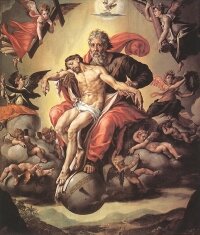 Within Christianity, the doctrine of the Trinity states that God is a single "Being" who exists, simultaneously and eternally, as a communion of three persons (personae, prosopa): Father (the Source, the Eternal Majesty); the Son (the eternal Logos or Word, incarnate as Jesus of Nazareth); and the Holy Spirit. Since the 4th Century AD, in both Eastern and Western Christianity, this doctrine has been stated as "One God in Three Persons," all three of whom, as distinct and co-eternal "persons" or "hypostases," share a single Divine essence, being, or nature.
Within Christianity, the doctrine of the Trinity states that God is a single "Being" who exists, simultaneously and eternally, as a communion of three persons (personae, prosopa): Father (the Source, the Eternal Majesty); the Son (the eternal Logos or Word, incarnate as Jesus of Nazareth); and the Holy Spirit. Since the 4th Century AD, in both Eastern and Western Christianity, this doctrine has been stated as "One God in Three Persons," all three of whom, as distinct and co-eternal "persons" or "hypostases," share a single Divine essence, being, or nature. The word Trinity comes from the Latin noun Trinitas, meaning the state or condition of being three, or a group of three persons or things. The first recorded application of this Latin word to Father, Son and Holy Spirit was by Tertullian in about 200 where he probably combined Latin words for three and one. Although the word Trinity is not found in Scripture, the principle is:
19Therefore go and make disciples of all nations, baptizing them in the name of the Father and of the Son and of the Holy Spirit (Matt. 28:19)The Greek term with the same meaning, Τρίας, has given the English word triad. The Sanskrit word, Trimurti, has a similar meaning.
In view of what is stated about Tertullian, it would be vain to look for the word "Τρίας" (Trinity) in the New Testament, which only speaks of God (often called "the Father"), of Jesus Christ (often called "the Son"), and of the Holy Spirit, and of the relationships between these.
More...


No comments:
Post a Comment